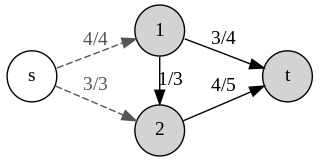Related Research Articles
In mathematics, specifically set theory, the continuum hypothesis is a hypothesis about the possible sizes of infinite sets. It states:
There is no set whose cardinality is strictly between that of the integers and the real numbers.
Linear predictive coding (LPC) is a method used mostly in audio signal processing and speech processing for representing the spectral envelope of a digital signal of speech in compressed form, using the information of a linear predictive model.
Freiling's axiom of symmetry is a set-theoretic axiom proposed by Chris Freiling. It is based on intuition of Stuart Davidson but the mathematics behind it goes back to Wacław Sierpiński.
In computer networking, linear network coding is a program in which intermediate nodes transmit data from source nodes to sink nodes by means of linear combinations.
Babak Hassibi is an Iranian-American electrical engineer, computer scientist, and applied mathematician who is the inaugural Mose and Lillian S. Bohn Professor of Electrical Engineering and Computing and Mathematical Sciences at the California Institute of Technology (Caltech). From 2011 to 2016 he was the Gordon M Binder/Amgen Professor of Electrical Engineering. During 2008-2015 he was the Executive Officer of Electrical Engineering and Associate Director of Information Science and Technology.

Michael George Luby is a mathematician and computer scientist, CEO of BitRipple, senior research scientist at the International Computer Science Institute (ICSI), former VP Technology at Qualcomm, co-founder and former chief technology officer of Digital Fountain. In coding theory he is known for leading the invention of the Tornado codes and the LT codes. In cryptography he is known for his contributions showing that any one-way function can be used as the basis for private cryptography, and for his analysis, in collaboration with Charles Rackoff, of the Feistel cipher construction. His distributed algorithm to find a maximal independent set in a computer network has also been influential.

Algebraic combinatorics is an area of mathematics that employs methods of abstract algebra, notably group theory and representation theory, in various combinatorial contexts and, conversely, applies combinatorial techniques to problems in algebra.
Sparse approximation theory deals with sparse solutions for systems of linear equations. Techniques for finding these solutions and exploiting them in applications have found wide use in image processing, signal processing, machine learning, medical imaging, and more.

An oriented matroid is a mathematical structure that abstracts the properties of directed graphs, vector arrangements over ordered fields, and hyperplane arrangements over ordered fields. In comparison, an ordinary matroid abstracts the dependence properties that are common both to graphs, which are not necessarily directed, and to arrangements of vectors over fields, which are not necessarily ordered.

Randall Dougherty is an American mathematician. Dougherty has made contributions in widely varying areas of mathematics, including set theory, logic, real analysis, discrete mathematics, computational geometry, information theory, and coding theory.
In mathematics, Ingleton's inequality is an inequality that is satisfied by the rank function of any representable matroid. In this sense it is a necessary condition for representability of a matroid over a finite field. Let M be a matroid and let ρ be its rank function, Ingleton's inequality states that for any subsets X1, X2, X3 and X4 in the support of M, the inequality
Peter Sanders is a German computer scientist who works as a professor of computer science at the Karlsruhe Institute of Technology. His research concerns the design, analysis, and implementation of algorithms and data structures, and he is particularly known for his research on suffix sorting finding shortest paths in road networks.
In matroid theory, a mathematical discipline, the girth of a matroid is the size of its smallest circuit or dependent set. The cogirth of a matroid is the girth of its dual matroid. Matroid girth generalizes the notion of the shortest cycle in a graph, the edge connectivity of a graph, Hall sets in bipartite graphs, even sets in families of sets, and general position of point sets. It is hard to compute, but fixed-parameter tractable for linear matroids when parameterized both by the matroid rank and the field size of a linear representation.
Walter John Whiteley is a professor in the department of mathematics and statistics at York University in Canada. He specializes in geometry and mathematics education, and is known for his expertise in structural rigidity and rigidity matroids.
Michelle Effros is the George Van Osdol Professor of Electrical Engineering at the California Institute of Technology. She has made significant contributions to data compression.
Nilanjana Datta is an Indian-born British mathematician. She is a Professor in Quantum Information Theory in the Department of Applied Mathematics and Theoretical Physics at the University of Cambridge, and a Fellow of Pembroke College.
Jack Justin Stiffler (1934–2019) was an American electrical engineer, computer scientist and entrepreneur, a Fellow of the Institute of Electrical and Electronics Engineers who made key contributions in the areas of communications and fault-tolerant computing.
John Cronan Kieffer is an American mathematician best known for his work in information theory, ergodic theory, and stationary process theory.
Mikael Skoglund is an academic born 1969 in Kungälv, Sweden. He is a professor of Communication theory, and the Head of the Division of Information Science and Engineering of the Department of Intelligent Systems at KTH Royal Institute of Technology. His research focuses on source-channel coding, signal processing, information theory, privacy, security, and with a particular focus on how information theory applies to wireless communications.
References
- ↑ Mumford, David (2000), "The dawning of the age of stochasticity", in Arnold, V.; Atiyah, M.; Lax, P.; Mazur, B. (eds.), Mathematics: Frontiers and Perspectives, Providence, RI: American Mathematical Society, pp. 197–218, MR 1754778 . See in particular p. 208: "This leads us to the stunning result of Christopher Freiling (1986): using the idea of throwing darts, we can disprove the continuum hypothesis."
- ↑ El Gamal, Abbas; Kim, Young-Han (2011), Network Information Theory, Cambridge University Press, p. 171, ISBN 9781139503143,
Dougherty, Freiling, and Zeger (2005) showed via an ingenious counterexample that unlike the multicast case, linear network coding fails to achieve the capacity region of a general graphical multimessage network error-free. This counterexample hinges on a deep connection between linear network coding and matroid theory.
- ↑ Chris Freiling at the Mathematics Genealogy Project
- ↑ Faculty/staff directory Archived 2016-10-11 at the Wayback Machine , CSUSB Mathematics Department, retrieved 2015-04-11.